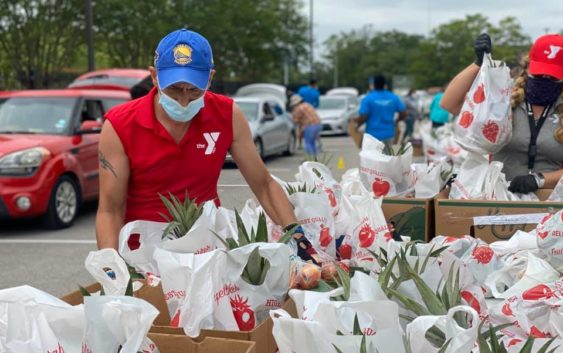- Recovery continues for western NC nearly two months after Hurricane Helene
- Recovery continues for western NC nearly three months after Hurricane Helene
- Cast of Scandal reunites to show support for western North Carolina after Hurricane Helene
- Tropical Storm Sara threatens to bring flash floods and mudslides to Central America
- Hurricane-stricken Tampa Bay Rays to play 2025 season at Yankees' spring training field in Tampa
Hurricane Laura Threatens Families, Nonprofits Already Strained By Pandemic

Nonprofits have traditionally stepped up to help people in the aftermath of hurricanes and tropical storms.
As Hurricane Laura threatens the Gulf Coast, many families in Greater Houston are already on the edge — financially, emotionally and with their health.
Bob Sanborn with the advocacy group Children at Risk spoke to Houston Public Media about how the natural disaster could make a difficult situation worse for vulnerable families, and what lessons have been learned from previous storms.
Listen to or read the interview below, edited for length and clarity.
Before we talk about any potential impact from Hurricane Laura, how would you describe the situation for vulnerable families here in our region, given the pandemic and the recession? How are people doing?
Yeah, people aren’t doing very well at all, right? You have families that are struggling today with food insecurity, with housing insecurity, with trying to find jobs when they’ve lost their jobs, no jobs available for poor families in our area. It’s very tough right now, on the parents and, certainly, on the kids. And so we worry, you know, we always worry about them going to good schools and doing well because that’s the way they pull themselves out of poverty eventually. But they’re not even getting to that point where they can think about school in many ways, because there’s so many other basic needs that have yet to be met.
When you add in the threat of a hurricane, what kind of impact could this have on low-income families, immigrant families, working class families here in our region?
I think it doesn’t add for a stable mental health condition. It makes people very worried. It’s a traumatic situation. But I think in the end, it’s families really worried about, “what’s going to happen to my kids,” right? “Am I going to be able to support my kids, put dinner on the table, a roof over their heads? Are we going to have power?” You know, “are we going to be able to keep them healthy? What does this mean for school if they’re in school?” So it’s just a lot of worries. And if you think about Maslow’s hierarchy of needs, basic needs is the bottom line. And usually as Americans, we can sort of say, “Well, at least we have the basic needs met.” But what the coronavirus and the threat of a hurricane does is it sort of puts that into play, right? Are we going to have our basic needs met?
What lessons do you think there are from previous storms? Notably we had Hurricane Harvey in 2017, Hurricane Ike back in 2008. Again, we still don’t know exactly what kind of impact this storm will have, but what lessons are there on how we can support families who are struggling?
What you find is that in all of those cases, nonprofits really stood up, and they were able to do all sorts of things to really help families. And I remember leading coalitions with each of those. Nonprofits all came together and said, “Well, let’s work on this.” The difference, though, is that this time, you know, we’re already underresourced. We’re already overworked, and nonprofits — I had a meeting this morning with a big group of 40 nonprofits and I think people didn’t know whether to laugh or to cry because they are overtaxed in terms of energy.
We’ve spent a lot of energy on the pandemic and trying to get help to families, and then this, it’s very tough. But I think what we need is to see our government leaders and our state leaders helping, you know, our city leaders, in terms of reacting to this and in terms of taking care of people. This idea of, we’ll take care of our own, you know, is an important idea, but it doesn’t work when you’re already overtaxed, when you already don’t have the resources you need. The pandemic is already a major disaster. And this has the added component of a disaster over disaster, which is going to be super hard on low-income families.
Subscribe to Today in Houston
Fill out the form below to subscribe our new daily editorial newsletter from the HPM Newsroom.